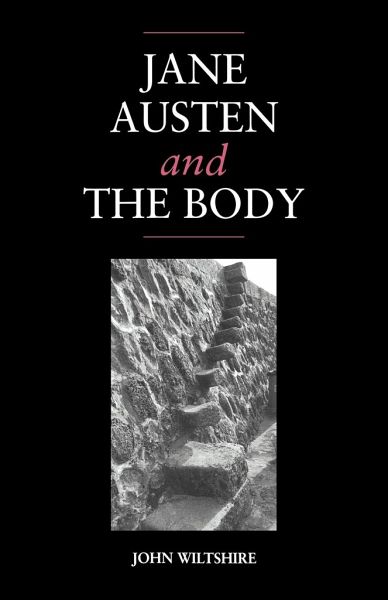
Jane Austen and the Body
'The Picture of Health'

PAYBACK Punkte
25 °P sammeln!
This book draws on modern theories of the body, and on eighteenth-century medical sources, to give a fresh and controversial reading of familiar texts.Jane Austen has been read as a novelist of manners, whose work discreetly avoids discussing the physical. John Wiltshire shows, on the contrary, how important are faces and bodies in her texts, from complainers and invalids like Mrs Bennet and Mr Woodhouse, to the frail, debilitated Fanny Price, the vulnerable Jane Fairfax, and the 'picture of health', Emma. Talk about health and illness in the novels is abundant, and constitutes community, but ...
This book draws on modern theories of the body, and on eighteenth-century medical sources, to give a fresh and controversial reading of familiar texts.
Jane Austen has been read as a novelist of manners, whose work discreetly avoids discussing the physical. John Wiltshire shows, on the contrary, how important are faces and bodies in her texts, from complainers and invalids like Mrs Bennet and Mr Woodhouse, to the frail, debilitated Fanny Price, the vulnerable Jane Fairfax, and the 'picture of health', Emma. Talk about health and illness in the novels is abundant, and constitutes community, but it also serves to disguise the operation of social and gender politics. Behind the medical paraphernalia and incidents are serious concerns with the nature of power as exerted through and on the body, and with the manifold meanings of illness. 'Nerves', 'spirits', and sensibility figure largely in these books, and Jane Austen is seen to offer a critique of the gendering power of illness and nursing or attendance upon illness. Drawing both on modern - medical and feminist - theories of illness and the body as well as on eighteenth-century medical sources to illuminate the novels, this book offers new and controversial, but also scholarly, readings of these familiar texts.
Review quote:
"An original and satisfying study, written in a style graced by wit and clarity."
American Library Association
"...a fine book, informed and sensitive, and it throws a spotlight on an aspect of Austen's work all too rarely noticed."
Juliet McMaster, Eighteenth-Century Fiction
"...Wiltshire possesses an exemplary grasp of recent scholarship in the history of medicine, while avoiding exaggerated claims for Austen as an interpreter of science and medicine. Not least, this engaging book displays a commendable capacity to analyze the role played by body language and corporeality in the early novel, while avoiding the mystifying jargon that scars so many literary studies of the body."
Roy Porter, Isis
"John Wiltishire's analysis is both innovative and probing..."
Judith Hattaway, English Language Notes
Table of contents:
Acknowledgements; A note on texts; Introduction: Jane Austen and the body; 1. Sense, sensibility and the proofs of affection; 2. 'Eloquent blood': the coming out of Fanny Price; 3. Emma: the picture of health; 4. Persuasion: the pshychopathology of everyday life; 5. Sanditon: the enjoyments of invalidism; Notes; Bibliography; Index.
Jane Austen has been read as a novelist of manners, whose work discreetly avoids discussing the physical. John Wiltshire shows, on the contrary, how important are faces and bodies in her texts, from complainers and invalids like Mrs Bennet and Mr Woodhouse, to the frail, debilitated Fanny Price, the vulnerable Jane Fairfax, and the 'picture of health', Emma. Talk about health and illness in the novels is abundant, and constitutes community, but it also serves to disguise the operation of social and gender politics. Behind the medical paraphernalia and incidents are serious concerns with the nature of power as exerted through and on the body, and with the manifold meanings of illness. 'Nerves', 'spirits', and sensibility figure largely in these books, and Jane Austen is seen to offer a critique of the gendering power of illness and nursing or attendance upon illness. Drawing both on modern - medical and feminist - theories of illness and the body as well as on eighteenth-century medical sources to illuminate the novels, this book offers new and controversial, but also scholarly, readings of these familiar texts.
Review quote:
"An original and satisfying study, written in a style graced by wit and clarity."
American Library Association
"...a fine book, informed and sensitive, and it throws a spotlight on an aspect of Austen's work all too rarely noticed."
Juliet McMaster, Eighteenth-Century Fiction
"...Wiltshire possesses an exemplary grasp of recent scholarship in the history of medicine, while avoiding exaggerated claims for Austen as an interpreter of science and medicine. Not least, this engaging book displays a commendable capacity to analyze the role played by body language and corporeality in the early novel, while avoiding the mystifying jargon that scars so many literary studies of the body."
Roy Porter, Isis
"John Wiltishire's analysis is both innovative and probing..."
Judith Hattaway, English Language Notes
Table of contents:
Acknowledgements; A note on texts; Introduction: Jane Austen and the body; 1. Sense, sensibility and the proofs of affection; 2. 'Eloquent blood': the coming out of Fanny Price; 3. Emma: the picture of health; 4. Persuasion: the pshychopathology of everyday life; 5. Sanditon: the enjoyments of invalidism; Notes; Bibliography; Index.




